An Examination of Inclusive Mental Health Policy in Australia
VerifiedAdded on 2023/04/17
|15
|3105
|126
Essay
AI Summary
This essay presents a comprehensive inclusive mental health policy designed for Australia, addressing the critical need for accessible and equitable mental healthcare services. It begins with an introduction highlighting the prevalence and impact of mental illness, emphasizing the need for effective policies to improve community well-being and productivity. The essay outlines the policy's vision, values (equity, accessibility, human rights, quality, cultural relevance, participation, and collaboration), and objectives. It proposes specific areas of action, including the establishment of a national mental health governance structure and the strengthening of leadership. The policy details a service organization model across primary, secondary, and tertiary healthcare levels. Implementation strategies are discussed, emphasizing awareness campaigns, resource allocation, and the involvement of various stakeholders to ensure the policy's success. The essay underscores the significance of this policy in coordinating programs, fortifying administration, and providing comprehensive mental health services. The policy aims to ensure quality and accessible mental health services for all Australians by addressing the implementation strategies and the allocation of resources, budget, and medication.
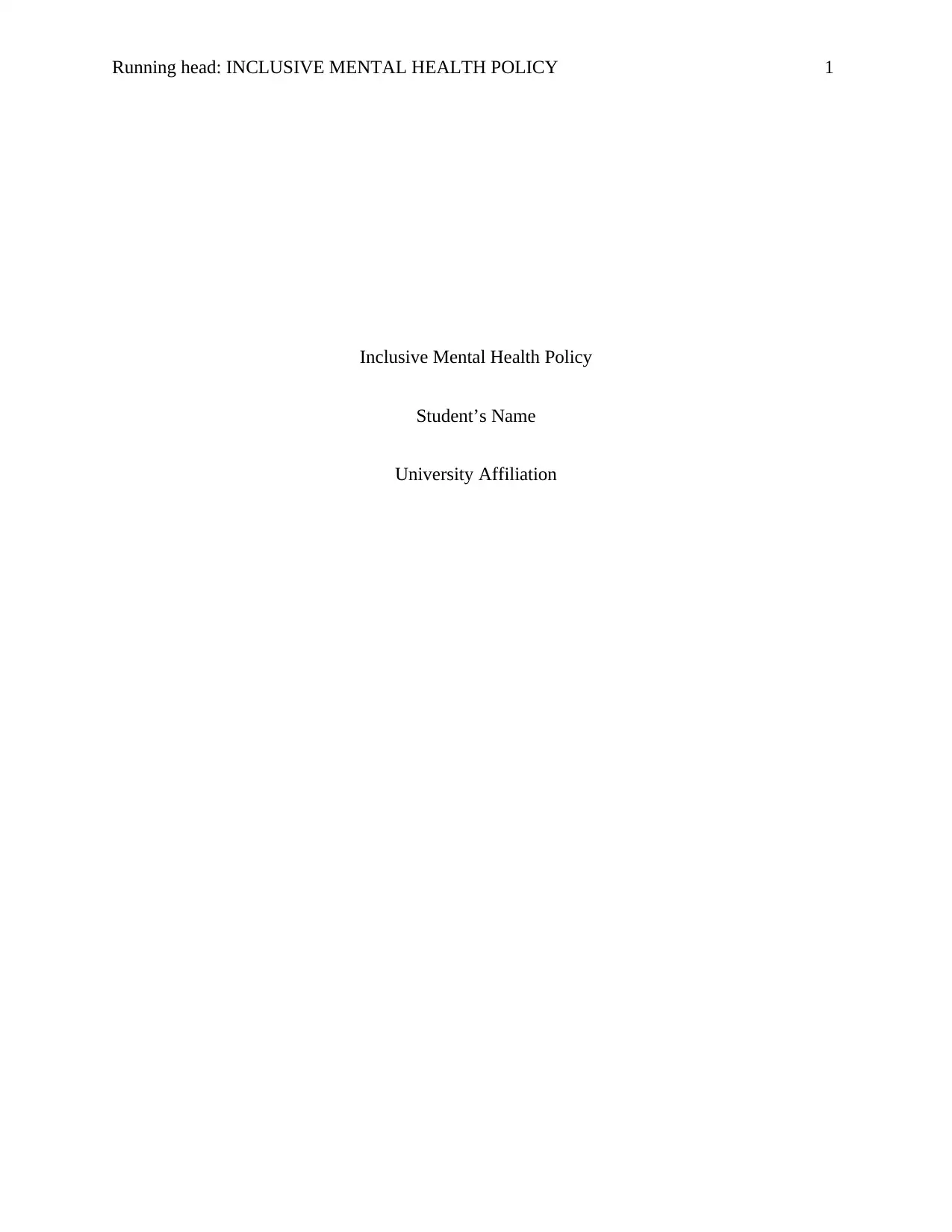
Running head: INCLUSIVE MENTAL HEALTH POLICY 1
Inclusive Mental Health Policy
Student’s Name
University Affiliation
Inclusive Mental Health Policy
Student’s Name
University Affiliation
Paraphrase This Document
Need a fresh take? Get an instant paraphrase of this document with our AI Paraphraser
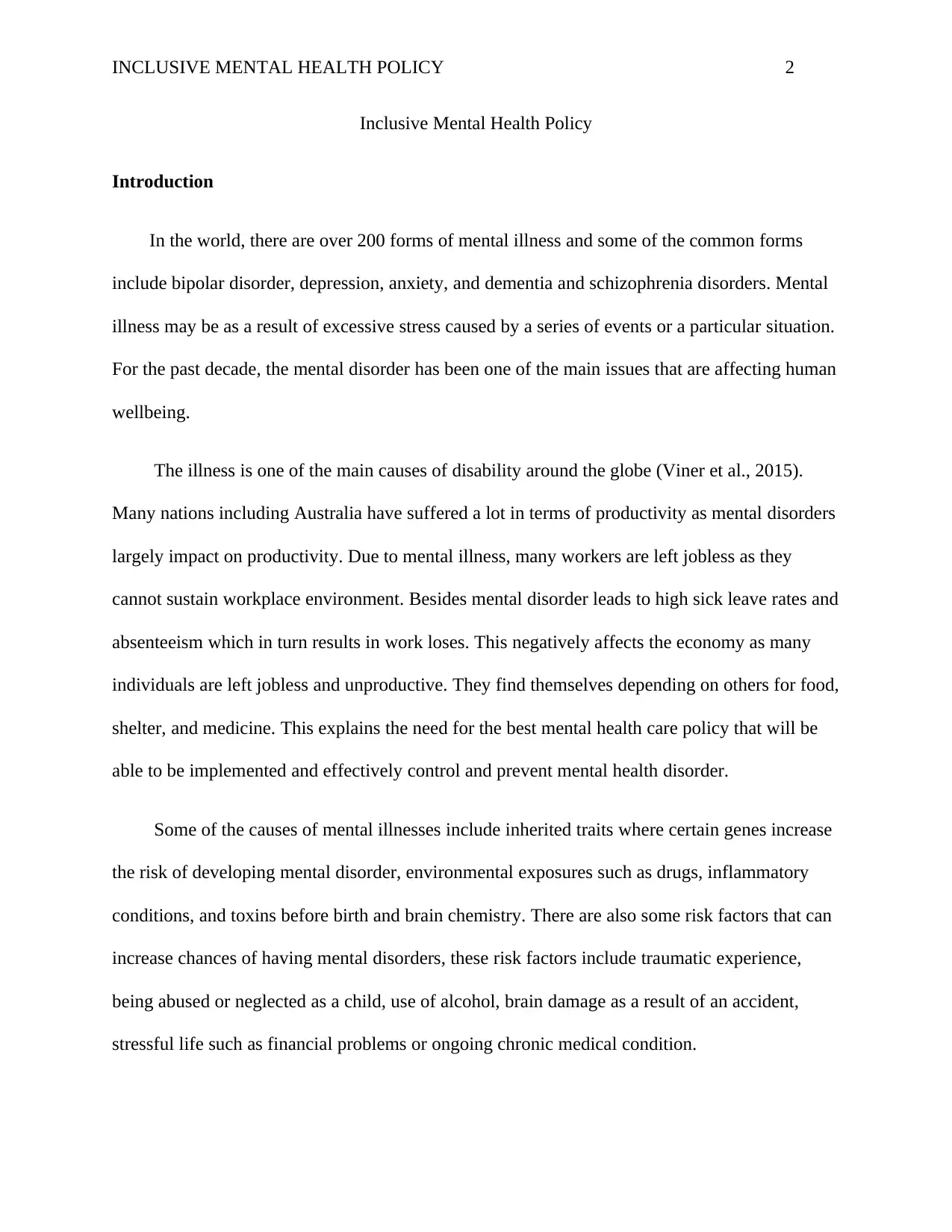
INCLUSIVE MENTAL HEALTH POLICY 2
Inclusive Mental Health Policy
Introduction
In the world, there are over 200 forms of mental illness and some of the common forms
include bipolar disorder, depression, anxiety, and dementia and schizophrenia disorders. Mental
illness may be as a result of excessive stress caused by a series of events or a particular situation.
For the past decade, the mental disorder has been one of the main issues that are affecting human
wellbeing.
The illness is one of the main causes of disability around the globe (Viner et al., 2015).
Many nations including Australia have suffered a lot in terms of productivity as mental disorders
largely impact on productivity. Due to mental illness, many workers are left jobless as they
cannot sustain workplace environment. Besides mental disorder leads to high sick leave rates and
absenteeism which in turn results in work loses. This negatively affects the economy as many
individuals are left jobless and unproductive. They find themselves depending on others for food,
shelter, and medicine. This explains the need for the best mental health care policy that will be
able to be implemented and effectively control and prevent mental health disorder.
Some of the causes of mental illnesses include inherited traits where certain genes increase
the risk of developing mental disorder, environmental exposures such as drugs, inflammatory
conditions, and toxins before birth and brain chemistry. There are also some risk factors that can
increase chances of having mental disorders, these risk factors include traumatic experience,
being abused or neglected as a child, use of alcohol, brain damage as a result of an accident,
stressful life such as financial problems or ongoing chronic medical condition.
Inclusive Mental Health Policy
Introduction
In the world, there are over 200 forms of mental illness and some of the common forms
include bipolar disorder, depression, anxiety, and dementia and schizophrenia disorders. Mental
illness may be as a result of excessive stress caused by a series of events or a particular situation.
For the past decade, the mental disorder has been one of the main issues that are affecting human
wellbeing.
The illness is one of the main causes of disability around the globe (Viner et al., 2015).
Many nations including Australia have suffered a lot in terms of productivity as mental disorders
largely impact on productivity. Due to mental illness, many workers are left jobless as they
cannot sustain workplace environment. Besides mental disorder leads to high sick leave rates and
absenteeism which in turn results in work loses. This negatively affects the economy as many
individuals are left jobless and unproductive. They find themselves depending on others for food,
shelter, and medicine. This explains the need for the best mental health care policy that will be
able to be implemented and effectively control and prevent mental health disorder.
Some of the causes of mental illnesses include inherited traits where certain genes increase
the risk of developing mental disorder, environmental exposures such as drugs, inflammatory
conditions, and toxins before birth and brain chemistry. There are also some risk factors that can
increase chances of having mental disorders, these risk factors include traumatic experience,
being abused or neglected as a child, use of alcohol, brain damage as a result of an accident,
stressful life such as financial problems or ongoing chronic medical condition.
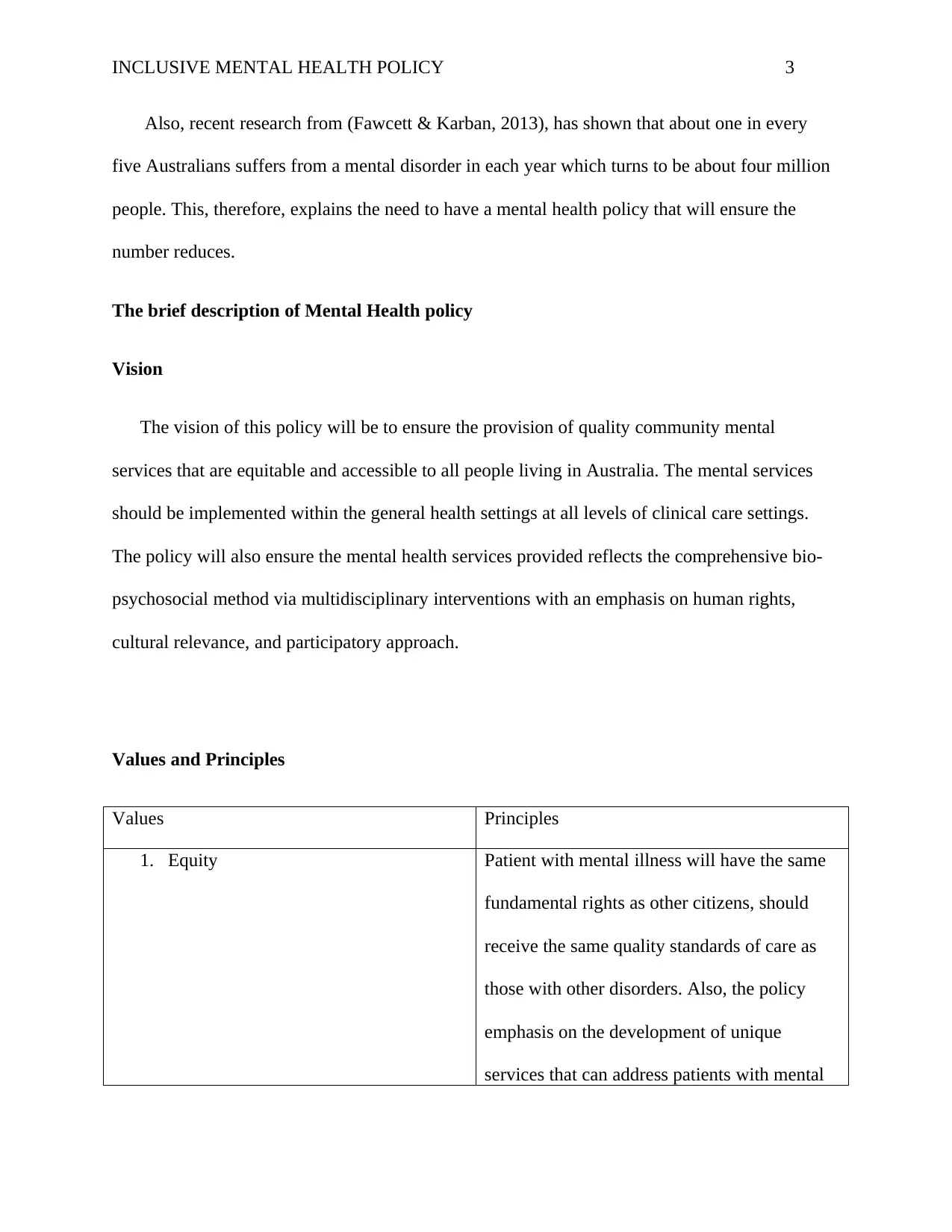
INCLUSIVE MENTAL HEALTH POLICY 3
Also, recent research from (Fawcett & Karban, 2013), has shown that about one in every
five Australians suffers from a mental disorder in each year which turns to be about four million
people. This, therefore, explains the need to have a mental health policy that will ensure the
number reduces.
The brief description of Mental Health policy
Vision
The vision of this policy will be to ensure the provision of quality community mental
services that are equitable and accessible to all people living in Australia. The mental services
should be implemented within the general health settings at all levels of clinical care settings.
The policy will also ensure the mental health services provided reflects the comprehensive bio-
psychosocial method via multidisciplinary interventions with an emphasis on human rights,
cultural relevance, and participatory approach.
Values and Principles
Values Principles
1. Equity Patient with mental illness will have the same
fundamental rights as other citizens, should
receive the same quality standards of care as
those with other disorders. Also, the policy
emphasis on the development of unique
services that can address patients with mental
Also, recent research from (Fawcett & Karban, 2013), has shown that about one in every
five Australians suffers from a mental disorder in each year which turns to be about four million
people. This, therefore, explains the need to have a mental health policy that will ensure the
number reduces.
The brief description of Mental Health policy
Vision
The vision of this policy will be to ensure the provision of quality community mental
services that are equitable and accessible to all people living in Australia. The mental services
should be implemented within the general health settings at all levels of clinical care settings.
The policy will also ensure the mental health services provided reflects the comprehensive bio-
psychosocial method via multidisciplinary interventions with an emphasis on human rights,
cultural relevance, and participatory approach.
Values and Principles
Values Principles
1. Equity Patient with mental illness will have the same
fundamental rights as other citizens, should
receive the same quality standards of care as
those with other disorders. Also, the policy
emphasis on the development of unique
services that can address patients with mental
⊘ This is a preview!⊘
Do you want full access?
Subscribe today to unlock all pages.

Trusted by 1+ million students worldwide
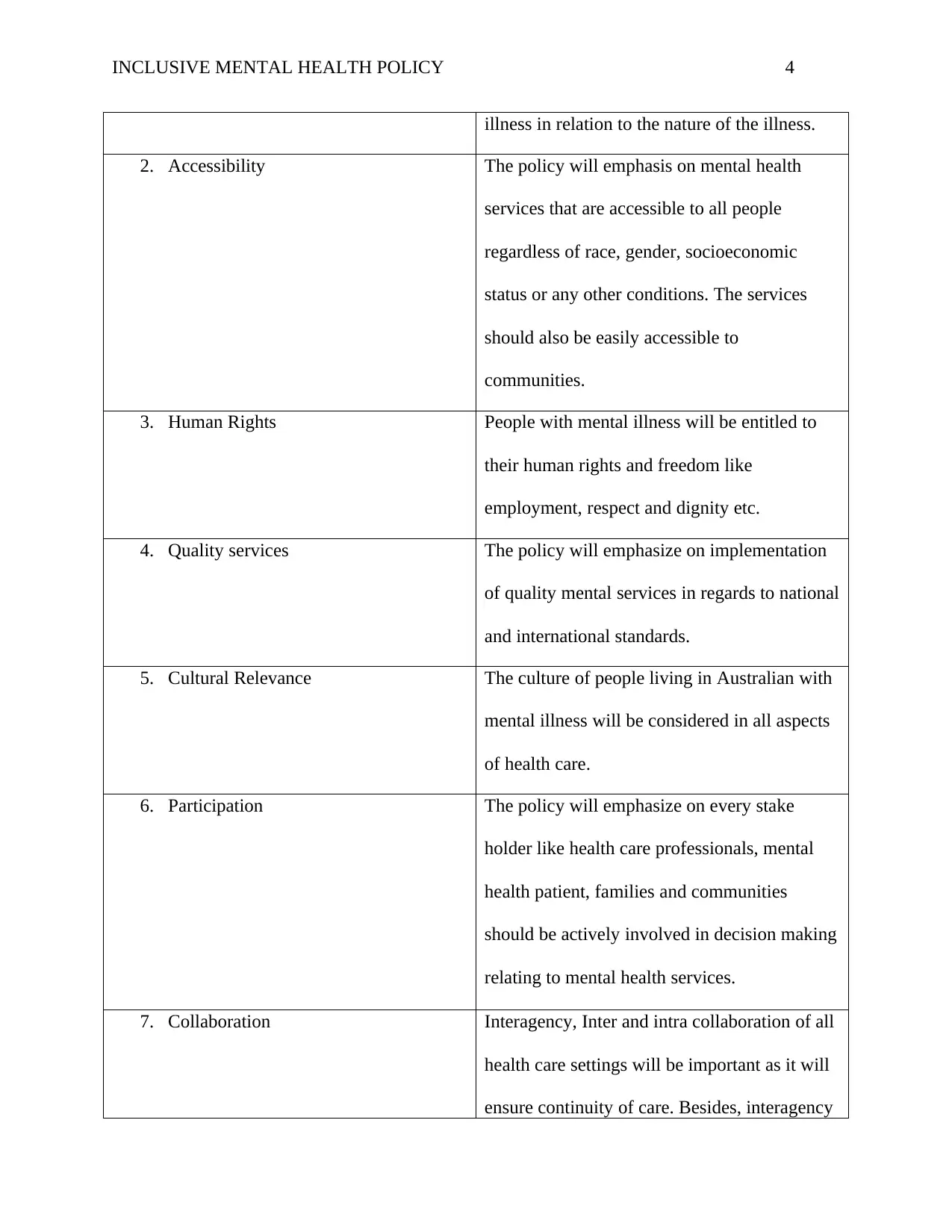
INCLUSIVE MENTAL HEALTH POLICY 4
illness in relation to the nature of the illness.
2. Accessibility The policy will emphasis on mental health
services that are accessible to all people
regardless of race, gender, socioeconomic
status or any other conditions. The services
should also be easily accessible to
communities.
3. Human Rights People with mental illness will be entitled to
their human rights and freedom like
employment, respect and dignity etc.
4. Quality services The policy will emphasize on implementation
of quality mental services in regards to national
and international standards.
5. Cultural Relevance The culture of people living in Australian with
mental illness will be considered in all aspects
of health care.
6. Participation The policy will emphasize on every stake
holder like health care professionals, mental
health patient, families and communities
should be actively involved in decision making
relating to mental health services.
7. Collaboration Interagency, Inter and intra collaboration of all
health care settings will be important as it will
ensure continuity of care. Besides, interagency
illness in relation to the nature of the illness.
2. Accessibility The policy will emphasis on mental health
services that are accessible to all people
regardless of race, gender, socioeconomic
status or any other conditions. The services
should also be easily accessible to
communities.
3. Human Rights People with mental illness will be entitled to
their human rights and freedom like
employment, respect and dignity etc.
4. Quality services The policy will emphasize on implementation
of quality mental services in regards to national
and international standards.
5. Cultural Relevance The culture of people living in Australian with
mental illness will be considered in all aspects
of health care.
6. Participation The policy will emphasize on every stake
holder like health care professionals, mental
health patient, families and communities
should be actively involved in decision making
relating to mental health services.
7. Collaboration Interagency, Inter and intra collaboration of all
health care settings will be important as it will
ensure continuity of care. Besides, interagency
Paraphrase This Document
Need a fresh take? Get an instant paraphrase of this document with our AI Paraphraser
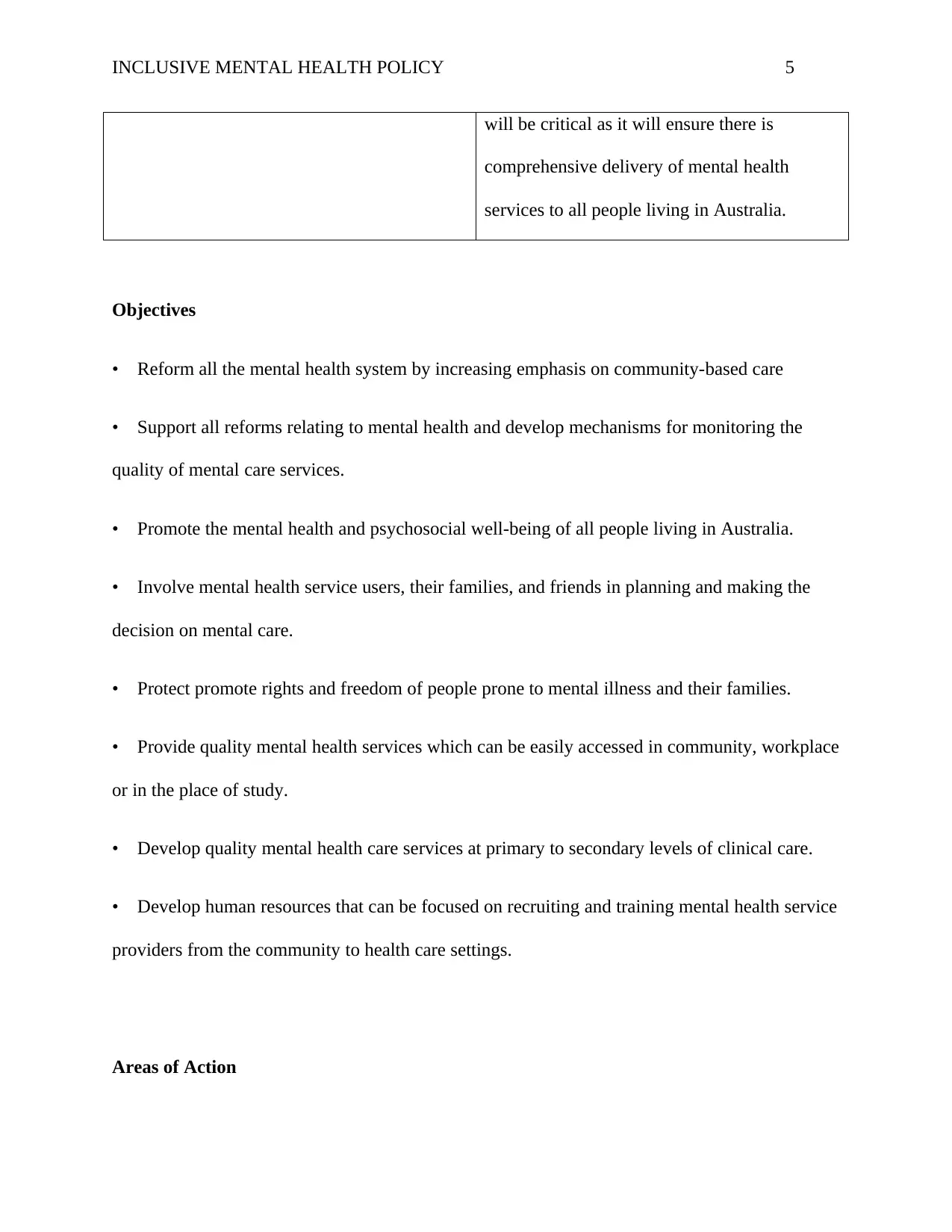
INCLUSIVE MENTAL HEALTH POLICY 5
will be critical as it will ensure there is
comprehensive delivery of mental health
services to all people living in Australia.
Objectives
• Reform all the mental health system by increasing emphasis on community-based care
• Support all reforms relating to mental health and develop mechanisms for monitoring the
quality of mental care services.
• Promote the mental health and psychosocial well-being of all people living in Australia.
• Involve mental health service users, their families, and friends in planning and making the
decision on mental care.
• Protect promote rights and freedom of people prone to mental illness and their families.
• Provide quality mental health services which can be easily accessed in community, workplace
or in the place of study.
• Develop quality mental health care services at primary to secondary levels of clinical care.
• Develop human resources that can be focused on recruiting and training mental health service
providers from the community to health care settings.
Areas of Action
will be critical as it will ensure there is
comprehensive delivery of mental health
services to all people living in Australia.
Objectives
• Reform all the mental health system by increasing emphasis on community-based care
• Support all reforms relating to mental health and develop mechanisms for monitoring the
quality of mental care services.
• Promote the mental health and psychosocial well-being of all people living in Australia.
• Involve mental health service users, their families, and friends in planning and making the
decision on mental care.
• Protect promote rights and freedom of people prone to mental illness and their families.
• Provide quality mental health services which can be easily accessed in community, workplace
or in the place of study.
• Develop quality mental health care services at primary to secondary levels of clinical care.
• Develop human resources that can be focused on recruiting and training mental health service
providers from the community to health care settings.
Areas of Action

INCLUSIVE MENTAL HEALTH POLICY 6
This policy strongly recommends for establishing national central governance for mental
health within the public health care administration. The policy also advocates strengthening of
leadership in mental health to create a framework for accountability. The mental health unit will
be one of the places where policy making and budget holding will be taking place. It will address
all the identified need for mental health services.
The unit will have a governing function, a national technical committee for mental health
representative among other key stakeholders in mental health. The unit will also involve the head
of public health care who will chair the national technical committee. The executive function
will be carried out by administrative and supporting staff. The unit will be accountable to His
Excellency the minister of health, mental health service users and their families and friends
(Wahlbeck, 2015).
The terms of reference for the Mental Health Unit will be as follows:
• Provide direction for mental health in Australia by developing national mental health policies
and plans.
• Establish mechanisms for protecting and promoting the rights and freedom of individuals
with mental disorders.
• Establish mechanisms for assessment and monitoring of all mental health services and
include mental health service users together with their families and friends in decision making.
• Convene mental health professionals across all states in Australia and call for consultations
and program implementation.
• Promote and follow up on the implementation of this mental health policy.
This policy strongly recommends for establishing national central governance for mental
health within the public health care administration. The policy also advocates strengthening of
leadership in mental health to create a framework for accountability. The mental health unit will
be one of the places where policy making and budget holding will be taking place. It will address
all the identified need for mental health services.
The unit will have a governing function, a national technical committee for mental health
representative among other key stakeholders in mental health. The unit will also involve the head
of public health care who will chair the national technical committee. The executive function
will be carried out by administrative and supporting staff. The unit will be accountable to His
Excellency the minister of health, mental health service users and their families and friends
(Wahlbeck, 2015).
The terms of reference for the Mental Health Unit will be as follows:
• Provide direction for mental health in Australia by developing national mental health policies
and plans.
• Establish mechanisms for protecting and promoting the rights and freedom of individuals
with mental disorders.
• Establish mechanisms for assessment and monitoring of all mental health services and
include mental health service users together with their families and friends in decision making.
• Convene mental health professionals across all states in Australia and call for consultations
and program implementation.
• Promote and follow up on the implementation of this mental health policy.
⊘ This is a preview!⊘
Do you want full access?
Subscribe today to unlock all pages.

Trusted by 1+ million students worldwide
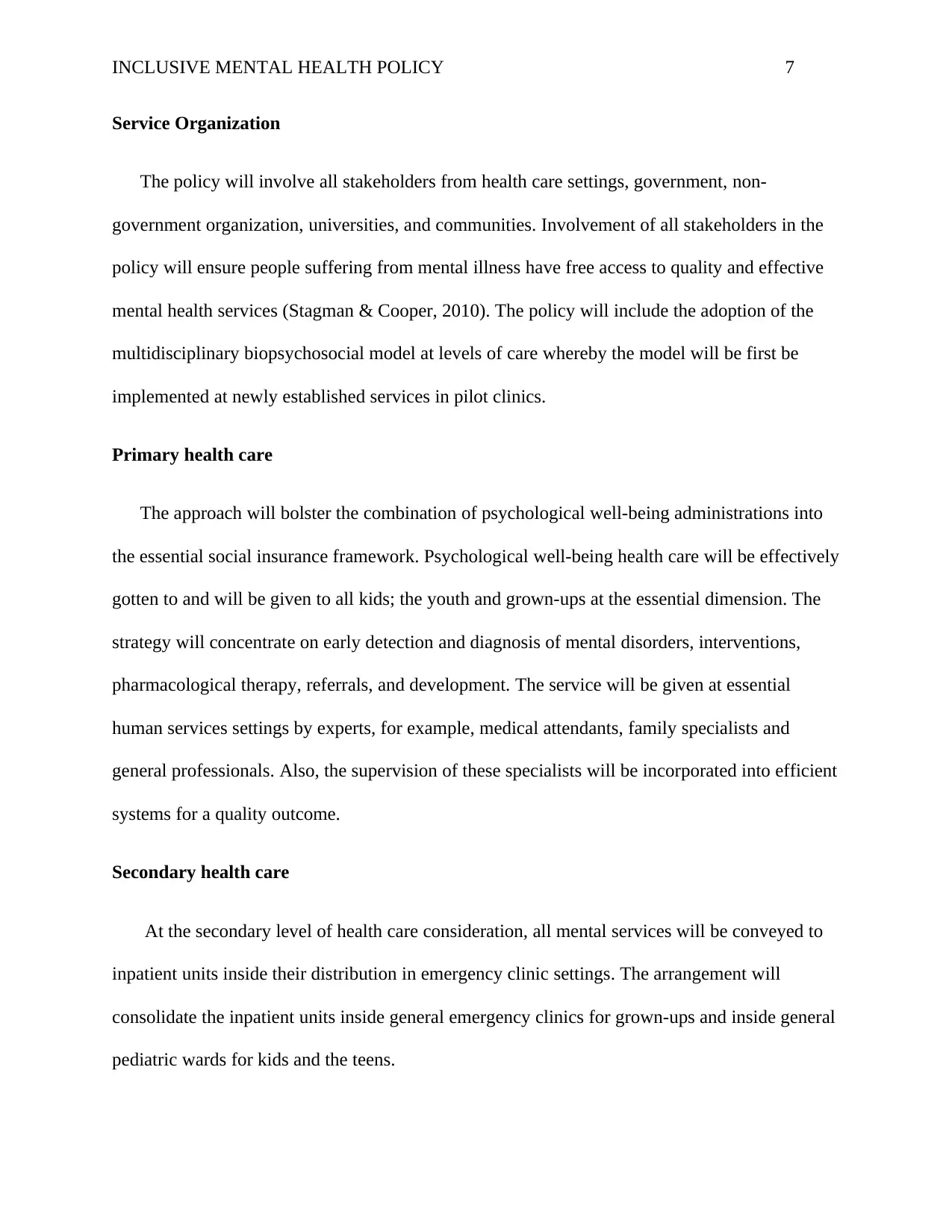
INCLUSIVE MENTAL HEALTH POLICY 7
Service Organization
The policy will involve all stakeholders from health care settings, government, non-
government organization, universities, and communities. Involvement of all stakeholders in the
policy will ensure people suffering from mental illness have free access to quality and effective
mental health services (Stagman & Cooper, 2010). The policy will include the adoption of the
multidisciplinary biopsychosocial model at levels of care whereby the model will be first be
implemented at newly established services in pilot clinics.
Primary health care
The approach will bolster the combination of psychological well-being administrations into
the essential social insurance framework. Psychological well-being health care will be effectively
gotten to and will be given to all kids; the youth and grown-ups at the essential dimension. The
strategy will concentrate on early detection and diagnosis of mental disorders, interventions,
pharmacological therapy, referrals, and development. The service will be given at essential
human services settings by experts, for example, medical attendants, family specialists and
general professionals. Also, the supervision of these specialists will be incorporated into efficient
systems for a quality outcome.
Secondary health care
At the secondary level of health care consideration, all mental services will be conveyed to
inpatient units inside their distribution in emergency clinic settings. The arrangement will
consolidate the inpatient units inside general emergency clinics for grown-ups and inside general
pediatric wards for kids and the teens.
Service Organization
The policy will involve all stakeholders from health care settings, government, non-
government organization, universities, and communities. Involvement of all stakeholders in the
policy will ensure people suffering from mental illness have free access to quality and effective
mental health services (Stagman & Cooper, 2010). The policy will include the adoption of the
multidisciplinary biopsychosocial model at levels of care whereby the model will be first be
implemented at newly established services in pilot clinics.
Primary health care
The approach will bolster the combination of psychological well-being administrations into
the essential social insurance framework. Psychological well-being health care will be effectively
gotten to and will be given to all kids; the youth and grown-ups at the essential dimension. The
strategy will concentrate on early detection and diagnosis of mental disorders, interventions,
pharmacological therapy, referrals, and development. The service will be given at essential
human services settings by experts, for example, medical attendants, family specialists and
general professionals. Also, the supervision of these specialists will be incorporated into efficient
systems for a quality outcome.
Secondary health care
At the secondary level of health care consideration, all mental services will be conveyed to
inpatient units inside their distribution in emergency clinic settings. The arrangement will
consolidate the inpatient units inside general emergency clinics for grown-ups and inside general
pediatric wards for kids and the teens.
Paraphrase This Document
Need a fresh take? Get an instant paraphrase of this document with our AI Paraphraser
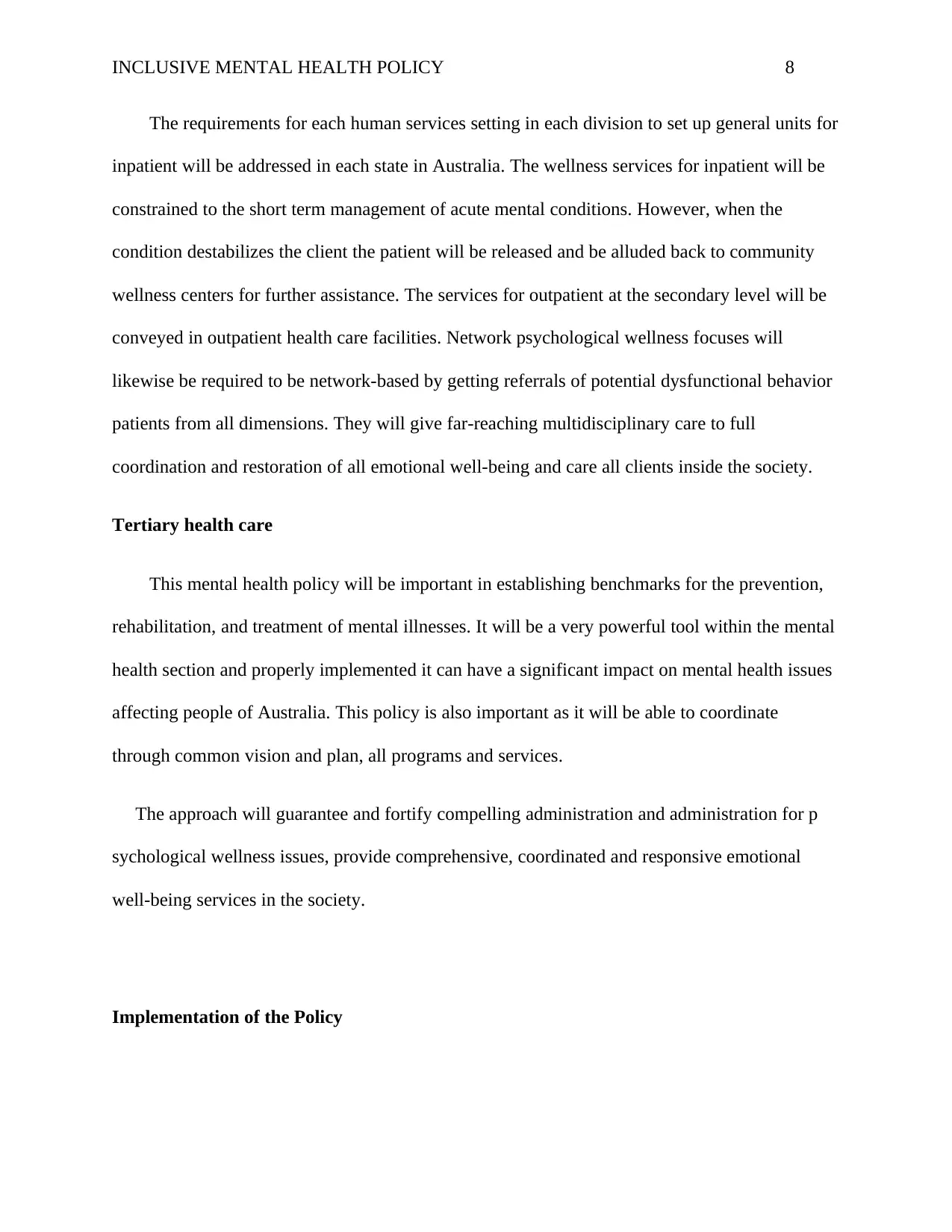
INCLUSIVE MENTAL HEALTH POLICY 8
The requirements for each human services setting in each division to set up general units for
inpatient will be addressed in each state in Australia. The wellness services for inpatient will be
constrained to the short term management of acute mental conditions. However, when the
condition destabilizes the client the patient will be released and be alluded back to community
wellness centers for further assistance. The services for outpatient at the secondary level will be
conveyed in outpatient health care facilities. Network psychological wellness focuses will
likewise be required to be network-based by getting referrals of potential dysfunctional behavior
patients from all dimensions. They will give far-reaching multidisciplinary care to full
coordination and restoration of all emotional well-being and care all clients inside the society.
Tertiary health care
This mental health policy will be important in establishing benchmarks for the prevention,
rehabilitation, and treatment of mental illnesses. It will be a very powerful tool within the mental
health section and properly implemented it can have a significant impact on mental health issues
affecting people of Australia. This policy is also important as it will be able to coordinate
through common vision and plan, all programs and services.
The approach will guarantee and fortify compelling administration and administration for p
sychological wellness issues, provide comprehensive, coordinated and responsive emotional
well-being services in the society.
Implementation of the Policy
The requirements for each human services setting in each division to set up general units for
inpatient will be addressed in each state in Australia. The wellness services for inpatient will be
constrained to the short term management of acute mental conditions. However, when the
condition destabilizes the client the patient will be released and be alluded back to community
wellness centers for further assistance. The services for outpatient at the secondary level will be
conveyed in outpatient health care facilities. Network psychological wellness focuses will
likewise be required to be network-based by getting referrals of potential dysfunctional behavior
patients from all dimensions. They will give far-reaching multidisciplinary care to full
coordination and restoration of all emotional well-being and care all clients inside the society.
Tertiary health care
This mental health policy will be important in establishing benchmarks for the prevention,
rehabilitation, and treatment of mental illnesses. It will be a very powerful tool within the mental
health section and properly implemented it can have a significant impact on mental health issues
affecting people of Australia. This policy is also important as it will be able to coordinate
through common vision and plan, all programs and services.
The approach will guarantee and fortify compelling administration and administration for p
sychological wellness issues, provide comprehensive, coordinated and responsive emotional
well-being services in the society.
Implementation of the Policy
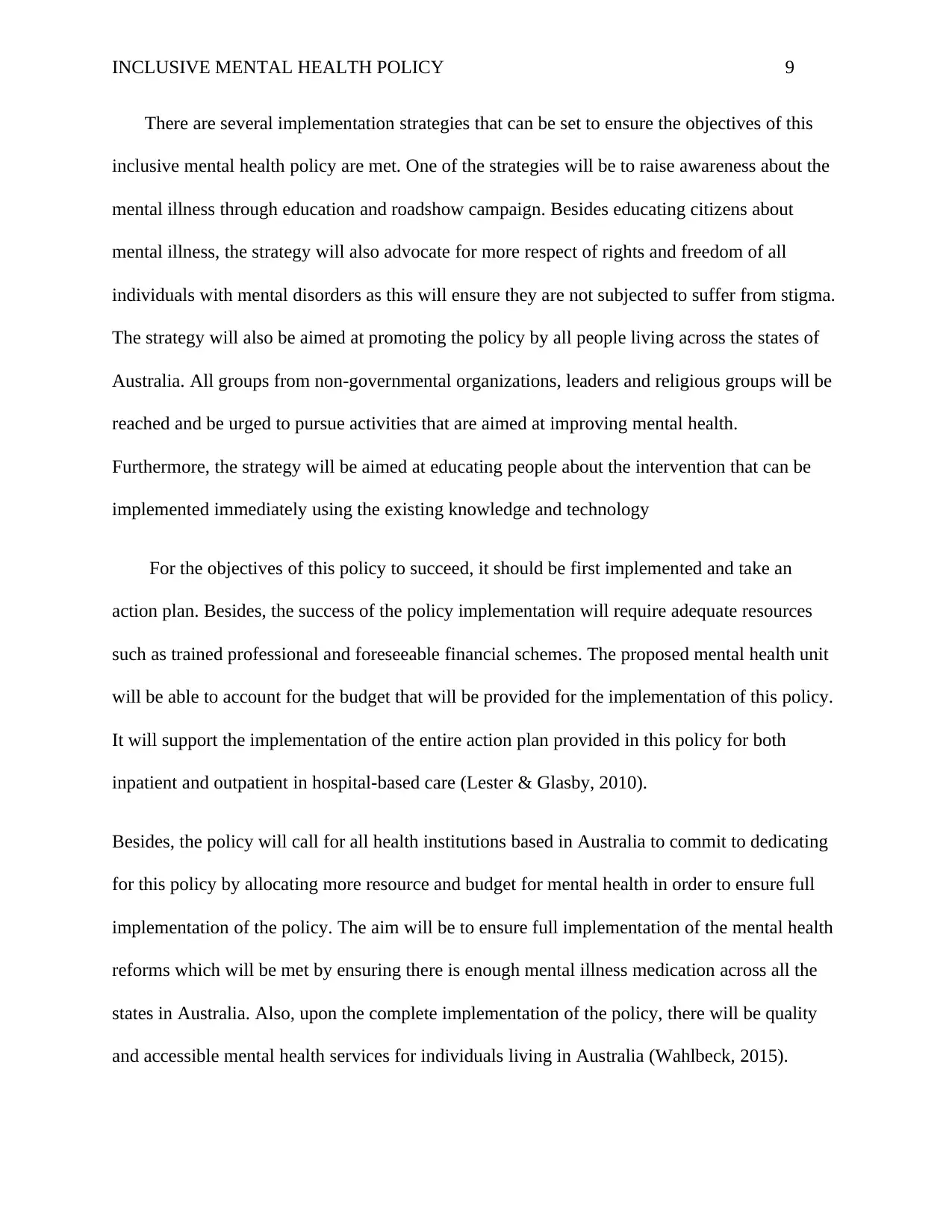
INCLUSIVE MENTAL HEALTH POLICY 9
There are several implementation strategies that can be set to ensure the objectives of this
inclusive mental health policy are met. One of the strategies will be to raise awareness about the
mental illness through education and roadshow campaign. Besides educating citizens about
mental illness, the strategy will also advocate for more respect of rights and freedom of all
individuals with mental disorders as this will ensure they are not subjected to suffer from stigma.
The strategy will also be aimed at promoting the policy by all people living across the states of
Australia. All groups from non-governmental organizations, leaders and religious groups will be
reached and be urged to pursue activities that are aimed at improving mental health.
Furthermore, the strategy will be aimed at educating people about the intervention that can be
implemented immediately using the existing knowledge and technology
For the objectives of this policy to succeed, it should be first implemented and take an
action plan. Besides, the success of the policy implementation will require adequate resources
such as trained professional and foreseeable financial schemes. The proposed mental health unit
will be able to account for the budget that will be provided for the implementation of this policy.
It will support the implementation of the entire action plan provided in this policy for both
inpatient and outpatient in hospital-based care (Lester & Glasby, 2010).
Besides, the policy will call for all health institutions based in Australia to commit to dedicating
for this policy by allocating more resource and budget for mental health in order to ensure full
implementation of the policy. The aim will be to ensure full implementation of the mental health
reforms which will be met by ensuring there is enough mental illness medication across all the
states in Australia. Also, upon the complete implementation of the policy, there will be quality
and accessible mental health services for individuals living in Australia (Wahlbeck, 2015).
There are several implementation strategies that can be set to ensure the objectives of this
inclusive mental health policy are met. One of the strategies will be to raise awareness about the
mental illness through education and roadshow campaign. Besides educating citizens about
mental illness, the strategy will also advocate for more respect of rights and freedom of all
individuals with mental disorders as this will ensure they are not subjected to suffer from stigma.
The strategy will also be aimed at promoting the policy by all people living across the states of
Australia. All groups from non-governmental organizations, leaders and religious groups will be
reached and be urged to pursue activities that are aimed at improving mental health.
Furthermore, the strategy will be aimed at educating people about the intervention that can be
implemented immediately using the existing knowledge and technology
For the objectives of this policy to succeed, it should be first implemented and take an
action plan. Besides, the success of the policy implementation will require adequate resources
such as trained professional and foreseeable financial schemes. The proposed mental health unit
will be able to account for the budget that will be provided for the implementation of this policy.
It will support the implementation of the entire action plan provided in this policy for both
inpatient and outpatient in hospital-based care (Lester & Glasby, 2010).
Besides, the policy will call for all health institutions based in Australia to commit to dedicating
for this policy by allocating more resource and budget for mental health in order to ensure full
implementation of the policy. The aim will be to ensure full implementation of the mental health
reforms which will be met by ensuring there is enough mental illness medication across all the
states in Australia. Also, upon the complete implementation of the policy, there will be quality
and accessible mental health services for individuals living in Australia (Wahlbeck, 2015).
⊘ This is a preview!⊘
Do you want full access?
Subscribe today to unlock all pages.

Trusted by 1+ million students worldwide
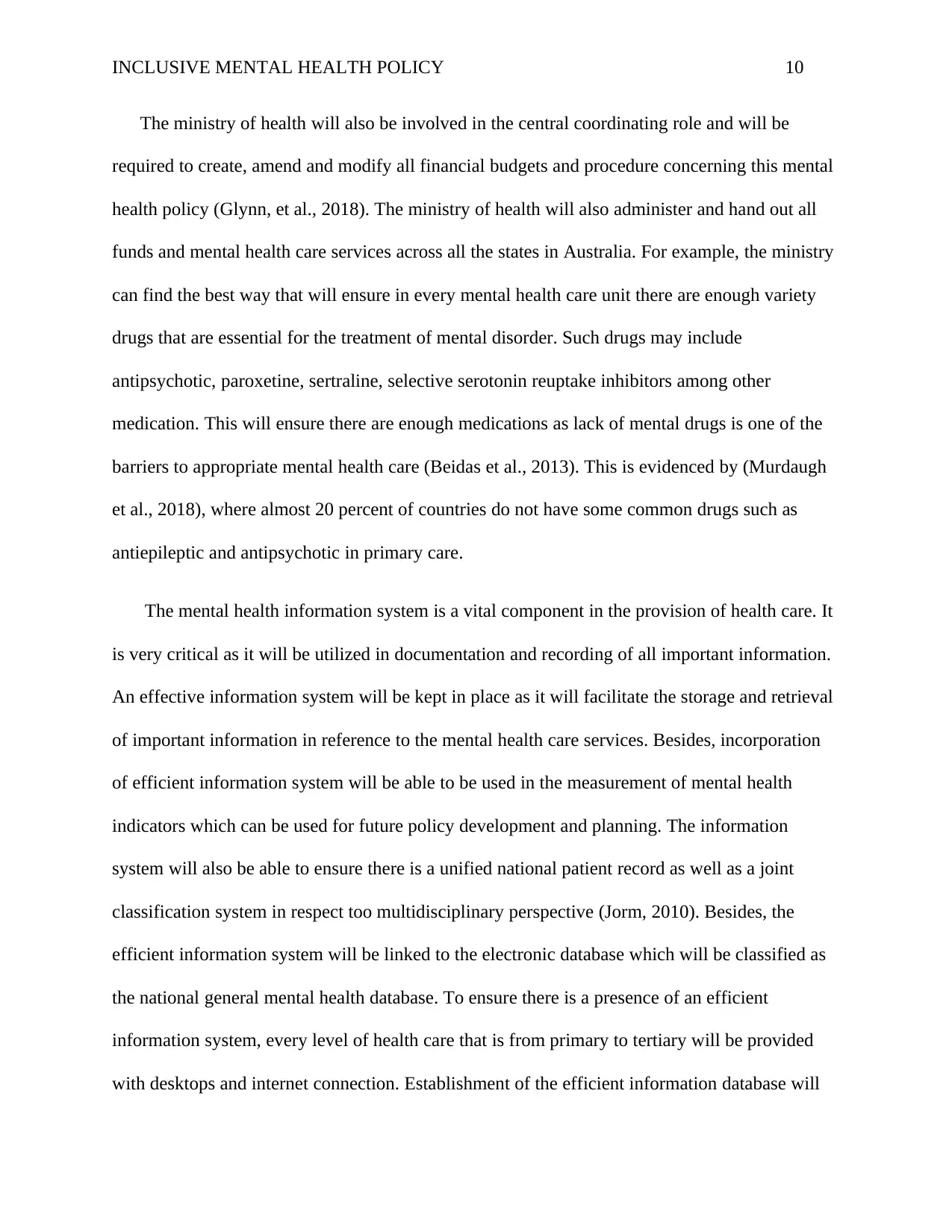
INCLUSIVE MENTAL HEALTH POLICY 10
The ministry of health will also be involved in the central coordinating role and will be
required to create, amend and modify all financial budgets and procedure concerning this mental
health policy (Glynn, et al., 2018). The ministry of health will also administer and hand out all
funds and mental health care services across all the states in Australia. For example, the ministry
can find the best way that will ensure in every mental health care unit there are enough variety
drugs that are essential for the treatment of mental disorder. Such drugs may include
antipsychotic, paroxetine, sertraline, selective serotonin reuptake inhibitors among other
medication. This will ensure there are enough medications as lack of mental drugs is one of the
barriers to appropriate mental health care (Beidas et al., 2013). This is evidenced by (Murdaugh
et al., 2018), where almost 20 percent of countries do not have some common drugs such as
antiepileptic and antipsychotic in primary care.
The mental health information system is a vital component in the provision of health care. It
is very critical as it will be utilized in documentation and recording of all important information.
An effective information system will be kept in place as it will facilitate the storage and retrieval
of important information in reference to the mental health care services. Besides, incorporation
of efficient information system will be able to be used in the measurement of mental health
indicators which can be used for future policy development and planning. The information
system will also be able to ensure there is a unified national patient record as well as a joint
classification system in respect too multidisciplinary perspective (Jorm, 2010). Besides, the
efficient information system will be linked to the electronic database which will be classified as
the national general mental health database. To ensure there is a presence of an efficient
information system, every level of health care that is from primary to tertiary will be provided
with desktops and internet connection. Establishment of the efficient information database will
The ministry of health will also be involved in the central coordinating role and will be
required to create, amend and modify all financial budgets and procedure concerning this mental
health policy (Glynn, et al., 2018). The ministry of health will also administer and hand out all
funds and mental health care services across all the states in Australia. For example, the ministry
can find the best way that will ensure in every mental health care unit there are enough variety
drugs that are essential for the treatment of mental disorder. Such drugs may include
antipsychotic, paroxetine, sertraline, selective serotonin reuptake inhibitors among other
medication. This will ensure there are enough medications as lack of mental drugs is one of the
barriers to appropriate mental health care (Beidas et al., 2013). This is evidenced by (Murdaugh
et al., 2018), where almost 20 percent of countries do not have some common drugs such as
antiepileptic and antipsychotic in primary care.
The mental health information system is a vital component in the provision of health care. It
is very critical as it will be utilized in documentation and recording of all important information.
An effective information system will be kept in place as it will facilitate the storage and retrieval
of important information in reference to the mental health care services. Besides, incorporation
of efficient information system will be able to be used in the measurement of mental health
indicators which can be used for future policy development and planning. The information
system will also be able to ensure there is a unified national patient record as well as a joint
classification system in respect too multidisciplinary perspective (Jorm, 2010). Besides, the
efficient information system will be linked to the electronic database which will be classified as
the national general mental health database. To ensure there is a presence of an efficient
information system, every level of health care that is from primary to tertiary will be provided
with desktops and internet connection. Establishment of the efficient information database will
Paraphrase This Document
Need a fresh take? Get an instant paraphrase of this document with our AI Paraphraser
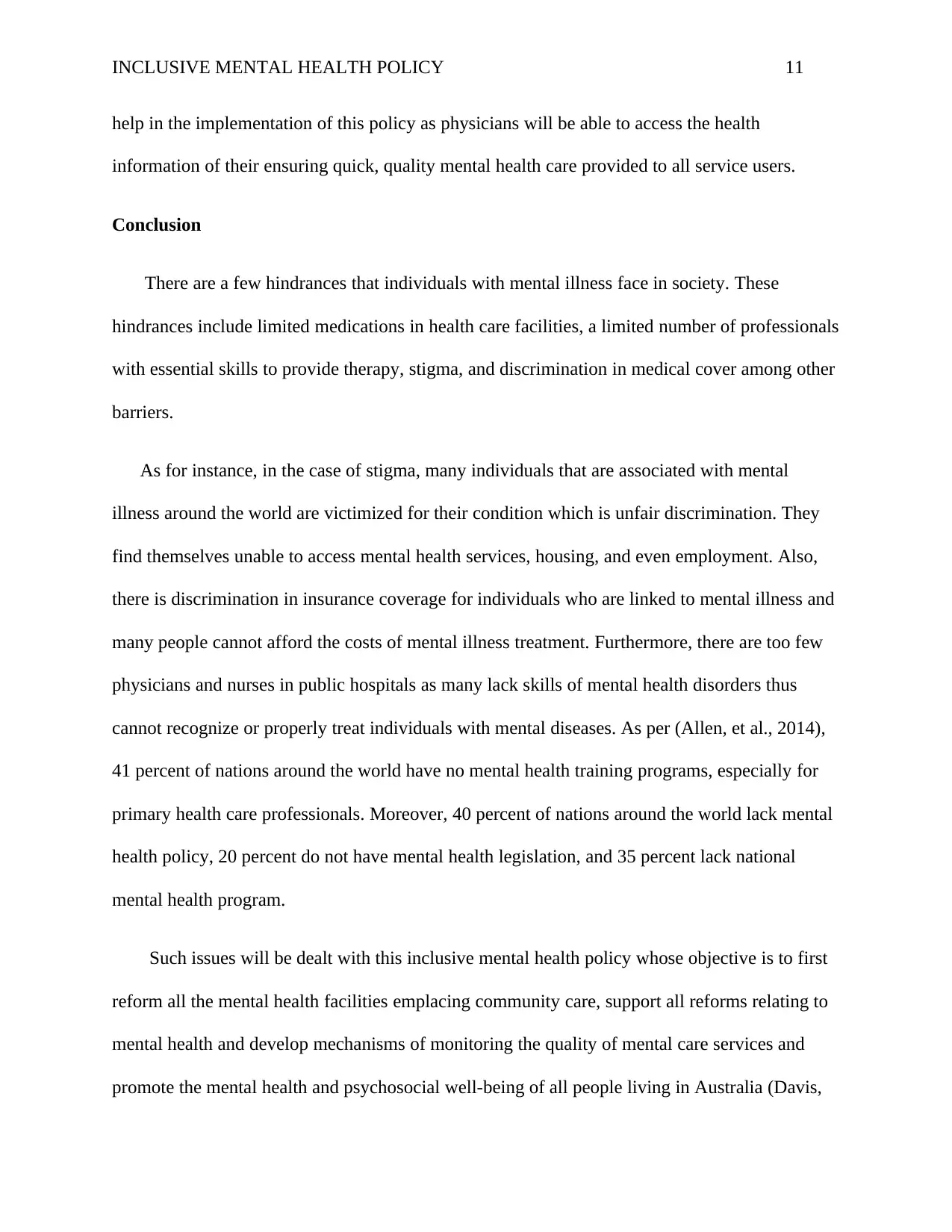
INCLUSIVE MENTAL HEALTH POLICY 11
help in the implementation of this policy as physicians will be able to access the health
information of their ensuring quick, quality mental health care provided to all service users.
Conclusion
There are a few hindrances that individuals with mental illness face in society. These
hindrances include limited medications in health care facilities, a limited number of professionals
with essential skills to provide therapy, stigma, and discrimination in medical cover among other
barriers.
As for instance, in the case of stigma, many individuals that are associated with mental
illness around the world are victimized for their condition which is unfair discrimination. They
find themselves unable to access mental health services, housing, and even employment. Also,
there is discrimination in insurance coverage for individuals who are linked to mental illness and
many people cannot afford the costs of mental illness treatment. Furthermore, there are too few
physicians and nurses in public hospitals as many lack skills of mental health disorders thus
cannot recognize or properly treat individuals with mental diseases. As per (Allen, et al., 2014),
41 percent of nations around the world have no mental health training programs, especially for
primary health care professionals. Moreover, 40 percent of nations around the world lack mental
health policy, 20 percent do not have mental health legislation, and 35 percent lack national
mental health program.
Such issues will be dealt with this inclusive mental health policy whose objective is to first
reform all the mental health facilities emplacing community care, support all reforms relating to
mental health and develop mechanisms of monitoring the quality of mental care services and
promote the mental health and psychosocial well-being of all people living in Australia (Davis,
help in the implementation of this policy as physicians will be able to access the health
information of their ensuring quick, quality mental health care provided to all service users.
Conclusion
There are a few hindrances that individuals with mental illness face in society. These
hindrances include limited medications in health care facilities, a limited number of professionals
with essential skills to provide therapy, stigma, and discrimination in medical cover among other
barriers.
As for instance, in the case of stigma, many individuals that are associated with mental
illness around the world are victimized for their condition which is unfair discrimination. They
find themselves unable to access mental health services, housing, and even employment. Also,
there is discrimination in insurance coverage for individuals who are linked to mental illness and
many people cannot afford the costs of mental illness treatment. Furthermore, there are too few
physicians and nurses in public hospitals as many lack skills of mental health disorders thus
cannot recognize or properly treat individuals with mental diseases. As per (Allen, et al., 2014),
41 percent of nations around the world have no mental health training programs, especially for
primary health care professionals. Moreover, 40 percent of nations around the world lack mental
health policy, 20 percent do not have mental health legislation, and 35 percent lack national
mental health program.
Such issues will be dealt with this inclusive mental health policy whose objective is to first
reform all the mental health facilities emplacing community care, support all reforms relating to
mental health and develop mechanisms of monitoring the quality of mental care services and
promote the mental health and psychosocial well-being of all people living in Australia (Davis,
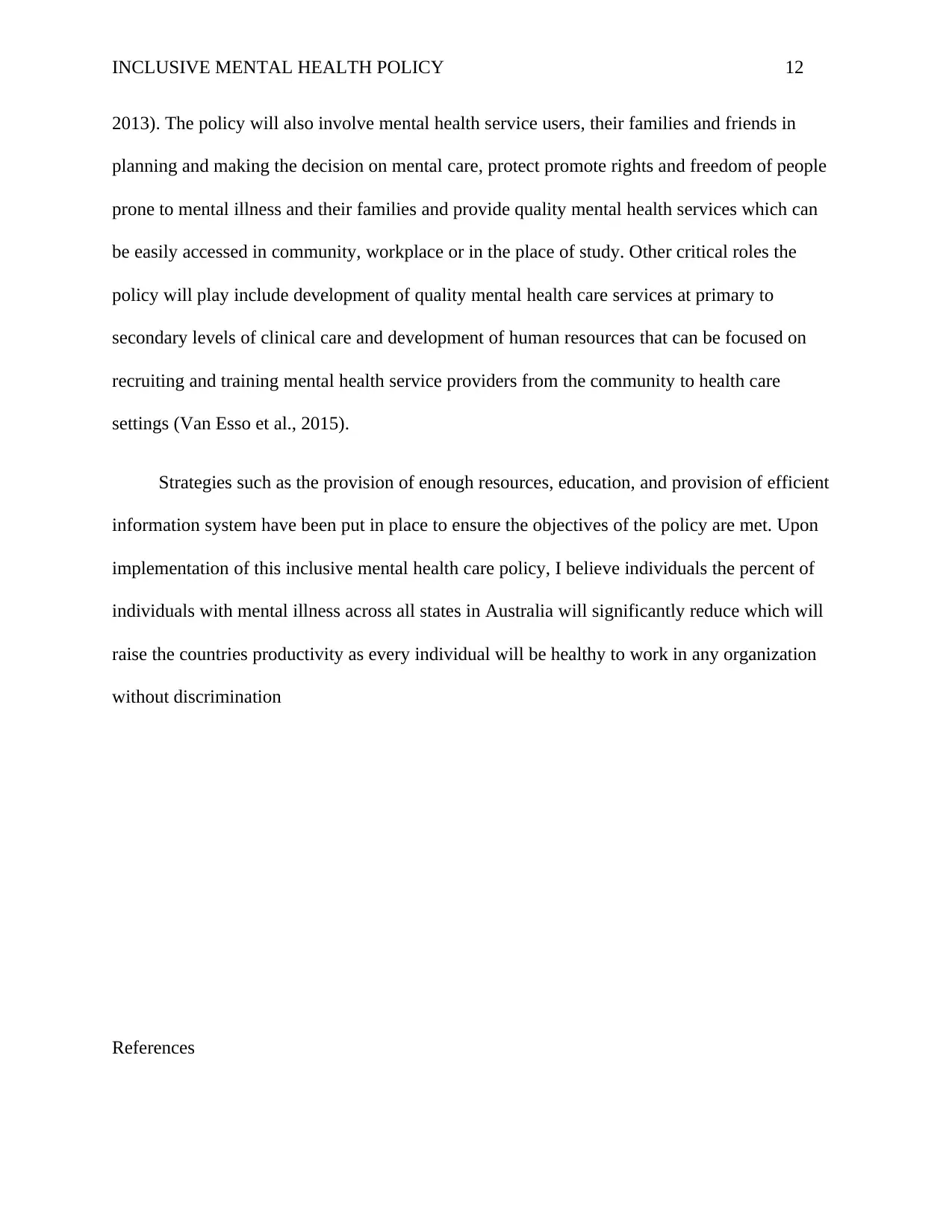
INCLUSIVE MENTAL HEALTH POLICY 12
2013). The policy will also involve mental health service users, their families and friends in
planning and making the decision on mental care, protect promote rights and freedom of people
prone to mental illness and their families and provide quality mental health services which can
be easily accessed in community, workplace or in the place of study. Other critical roles the
policy will play include development of quality mental health care services at primary to
secondary levels of clinical care and development of human resources that can be focused on
recruiting and training mental health service providers from the community to health care
settings (Van Esso et al., 2015).
Strategies such as the provision of enough resources, education, and provision of efficient
information system have been put in place to ensure the objectives of the policy are met. Upon
implementation of this inclusive mental health care policy, I believe individuals the percent of
individuals with mental illness across all states in Australia will significantly reduce which will
raise the countries productivity as every individual will be healthy to work in any organization
without discrimination
References
2013). The policy will also involve mental health service users, their families and friends in
planning and making the decision on mental care, protect promote rights and freedom of people
prone to mental illness and their families and provide quality mental health services which can
be easily accessed in community, workplace or in the place of study. Other critical roles the
policy will play include development of quality mental health care services at primary to
secondary levels of clinical care and development of human resources that can be focused on
recruiting and training mental health service providers from the community to health care
settings (Van Esso et al., 2015).
Strategies such as the provision of enough resources, education, and provision of efficient
information system have been put in place to ensure the objectives of the policy are met. Upon
implementation of this inclusive mental health care policy, I believe individuals the percent of
individuals with mental illness across all states in Australia will significantly reduce which will
raise the countries productivity as every individual will be healthy to work in any organization
without discrimination
References
⊘ This is a preview!⊘
Do you want full access?
Subscribe today to unlock all pages.

Trusted by 1+ million students worldwide
1 out of 15
Related Documents
Your All-in-One AI-Powered Toolkit for Academic Success.
+13062052269
info@desklib.com
Available 24*7 on WhatsApp / Email
![[object Object]](/_next/static/media/star-bottom.7253800d.svg)
Unlock your academic potential
Copyright © 2020–2026 A2Z Services. All Rights Reserved. Developed and managed by ZUCOL.





